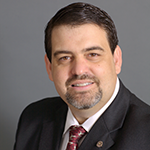The financial services world is often viewed as Wall Street versus Main Street. Citibank’s Maria Zywiciel knows firsthand how there can be perceived or real conflicts between these two groups, which is why her team of 30 employees is reinvesting in communities, a cause close to home for the director of strategic markets who is celebrating her 10th anniversary with Citi.
Zywiciel’s parents came to the United States from Mexico in the 1950s and had a difficult time finding housing in the suburbs of Chicago. “Thankfully, the Community Reinvestment Act of 1977 was enacted to eliminate redlining by offering access to credit in areas where it wasn’t previously offered,” she says. “That helped people like my parents realize their dream of homeownership.”
Today, Zywiciel’s role is to not only follow the government-mandated requirements, but to care about the spirit of the law. “Not only do immigrants come to the United States looking for a better life, but a lot of hard-working native-born citizens also want a part of the American dream of home ownership,” she says. “I make it my mission to bring that dream to a reality.”
Citibank
By the Numbers
700+
Families that received a mortgage through the Home Run Program, resulting in close to $140 million funded as of October 2013
56%
Percentage of Hispanics report that a major reason they purchased a home was because it represents a symbol of success or achievement, compared to only 32 percent of all Americans.*
*NAHREP data: 2012 State of Hispanic Homeownership Annual Report
Citibank looks at all bank markets in order to find ways that can help low- and moderate-income families find affordable financing, and the company offers competitive pricing and mortgage solutions. Citibank also works closely with community partners across the country, such as housing nonprofits, housing finance agencies, and municipalities, to get the word out through outreach, specialized events, and seminars. The aim of these events is to educate people about the steps to buying a home, applying for grants, and foreclosure prevention.
Zywiciel’s team is tasked with developing new programs to further help these families. For example, the Home Run Program offers low- and medium-income families an affordable finance option. “Many families are financially responsible, work hard, but still find it difficult to cover the costs of a mortgage,” Zywiciel says. “The Home Run program offers flexible underwriting solutions and low out-of-pocket expense, important for people making 80 percent or less of HUD Area Median Income.”
The key to the program’s success is aligning with community partners, offering customers holistic counseling, and teaching the families the fundamentals of financial literacy. Some important topics touched upon are budgeting, the importance of emergency funds, and the upkeep of the house once it is acquired. “The program benefits the community, beginning with one borrower and one home, then grows outward by stabilizing a neighborhood, then a community,” Zywiciel says. Such grassroots success brings in more jobs and, ideally, municipalities become involved in the gentrification process.
Citi’s Home Run Program was developed to complement the government’s Neighborhood Stabilization Program after the housing meltdown in 2008. The program continues to grow, and more than 1,000 underserved families have been helped. The program is unique in part because its mortgages are kept in Citibank’s own portfolio, rather than sold to government-sponsored agencies like Fannie Mae or Freddie Mac, which some other lenders do.
Citibank provides its staff many opportunities, too. Zywiciel loves her role because the company takes care of its employees and provides advancement opportunities and professional development. Citibank also offers a great work-life balance, which means Zywiciel still has time to spend with her children. “I also love my job, because at the end of the day, it feels like I am doing something positive,” she says.
Zywiciel’s work with the community doesn’t end when she leaves the office. She has served on various boards and associations around St. Louis and on a national level. She got involved in the St. Louis Hispanic Chamber of Commerce when she relocated, because Hispanic communities are something she has always gravitated toward and she likes being a voice for underserved markets. Serving on the board has helped her guide people to do something positive with their lives. In 2010, Zywiciel started the Hispanic Employee Network at Citibank, because she didn’t see enough Hispanic leaders sharing their backgrounds and life experiences. She wanted to build a network among successful people in the company and work to mentor others on their way to success, helping those that were becoming discouraged or needed a boost of confidence.

